- Home
- Stephen Hunter
Hot Springs (Earl Swagger) Page 19
Hot Springs (Earl Swagger) Read online
Page 19
Earl gritted his teeth hard.
• • •
At 8:20 Earl stopped at a Greek’s, got a hamburger and a cup of coffee and read the papers. More about Jayhawkers and who they’d kill next. When would indictments be delivered or did Becker’s control over the grand jury give his raiders carte blanche to rob and kill whoever they wanted? Who were these Jayhawkers? How come they never met the press or issued statements? How come the good citizens of Hot Springs didn’t know who they were or have any explanation of how they worked?
After eating, he got back in his vehicle and began a long slow turn out Malvern, past the Pythian Hotel and Mary Jane’s, and then went onward for another several blocks, just in case.
At Mary Jane’s he saw nothing, no commotion or anything. It was just another beer joint/whorehouse with some slots in the bar, like a hundred other Hot Springs places. There was no sense that tonight would be any different than any other night: a few girls sat listlessly in the upstairs windows, but there wasn’t enough street traffic yet for them to start their yelling. The downstairs of the place didn’t seem very full of men, though later on, of course, it would be different. White boys wouldn’t head on down to Niggertown for a piece of chocolate until they were well drunk and had got their courage up. Black men were probably still working their jobs, cleaning out the toilets in the big hotels or running the dirty towels to the big washing machines in the bathhouses or rounding up the garbage.
But Earl got a good glimpse of the place. It was a brick building standing alone on the street, with shabby buildings nearby but not abutting it. Possibly it had once been a store of some sort, before the black people had moved into this part of town and took it over. It had a big front window, shaded, and above there were a bunch of windows that looked down on Malvern. Earl liked the bricks; he’d worry about a wooden building because heavy bullets like those from a BAR would sail clean through and do who knew what damage farther down the block.
Earl made three more circuits on his grand trek, making sure he wasn’t followed, making sure that nothing was out of order, that no cops had set up. So far it looked like a go.
At 9:20 he dropped a nickel into a downtown phone box and called D.A., who had a network of snitches he’d been working.
“Are we all set?” D.A. asked.
“Yes sir. The boys are ready. I haven’t made radio contact with them yet, but that’ll happen soon. Any news?”
“One of my snitches told me that around noon, a truck pulled up behind Mary Jane’s, and a bunch of white men got out and hustled in.”
“They’re loading up. They’ve bitten.”
“He said there were eight of them, in overalls. Earl, eight’s a bit. They could cause some serious wreckage.”
“Yes sir. I think we can still get it done. I don’t want to postpone at this point. We have the jump on them.”
“All right, Earl. I trust your judgment on this one. I haven’t told Becker yet. He’s going to be pissed.”
“Yes sir. But this was a good plan and it’s going to work and the boys wanted to push it. I still think it’s going to be a great night for our side.”
“Well, Earl, God bless us. Remember, wear your vest. I’ll go to Becker at exactly 10:00 P.M. when you hit, and have him order up medical backup and the police to set up a perimeter.”
“Yes sir.”
Earl hung up.
He drove around a bit, wondering when the streets would fill up. But strangely they never did. A few white men seemed to mosey around the area but that density of the black throngs that was such a fervid feature of Malvern Avenue, that sense of whores and workingmen and jive joints and housewives and kids, of them all in it together, riding the same ship toward the same far destiny, that was gone.
Finally, at 9:40 he pulled up a few blocks away, parked and went into a small grocery. A few old black men lounged near the cash register where the proprietor sat.
“Howdy,” Earl said. “Looking for a place called Mary Jane’s. Y’all know where that is? Heard a fella could have hisself a good old time there.”
The men looked at one another, then over to the proprietor, the wisest among them clearly, who at last spoke.
“Suh, I’d take my business out of town tonight. There’s a strange feelin’ in the air. The wimmens been talkin’ ’bout it all afternoon. Git your babies in, they been sayin’. There’s gonna be bad-ass troubles over there at Mary Jane’s tonight. Gun trouble, the worst kind of trouble there is.”
Earl nodded.
“Sir, I think you’re speaking the truth.”
“You look like a cop, suh,” said the old grocer.
“Grandpop, I am,” said Earl, “and y’all have picked up on something. Make sure your children are in because it’s going to be a loud one, I guarantee you.”
“Y’all going to kill any Negroes?”
“Don’t aim to, Grandpop. This one’s between the white boys.”
• • •
There was no Mary Jane and there never had been. No one could remember why the place was called by her name. Its owner was a tall, yellow-skinned black man named Memphis Dogood. Memphis had two long razor cuts on the left side of his face, one of which began on his forehead, opened a hairless gap in his eyebrow, skipped his recessed eye and picked up again, running down his cheek. The other crossed it about an inch above the jawline. One—the long one—was delivered by a gal named Emma Mae in New Orleans in 1933. He couldn’t remember how he got the other scar, or which came first.
In Mary Jane’s, Memphis made the decisions. He rented the slots, ancient, tarnished machines from before the First War, a couple of old Mills Upright Perfections, a Dewey Floor Wheel or two and even one rattly old Fey Liberty Bell, from the Boss—a Grumley cousin named Willis Burr, far beneath even Pap’s notice—and bought his liquor as well from the Boss. He paid 48 percent of everything to the Boss. He skimmed a little, but every time the Boss looked at him with squeezed eyes and jiggled the spit in the pouch of his mouth, mixing it with tobaccy juice for a nice hard splat, as if he were puzzling over the figures, it scared Memphis so he swore he’d never do it no more. But he always did.
Memphis ran a fair joint. The gals might act up but usually Marie-Claire, the octoroon, took care of them. She was his main gal, and she packed a wallop in her left fist. His customers were also usually all right. Some of the younger bloods might act up now and then, on booze or reefer, and he’d once had to thump a boy with a sap so hard the boy never woke up and had to be laid out by the tracks. The police come by to ask questions, but nothing never came of it. Now and then, a white boy or usually two or four white boys, usually drunk, would show up, on the hunt for some colored pussy, because you wasn’t no man till you dipped your pen in ink. They were well treated, for it was always known that if you hurt a white boy there’d be all kinds of hell to pay.
On that day, Memphis Dogood fully expected no surprises. He was vaguely aware that something of a political nature was happening in town but those things usually ran their course on the other side of the line. He had no opinions about vice or gambling or prostitution, except that he hated reformers and knew a few who’d preach all day, work up a sweat, then come on down for some relaxation with his gals, so he knew them to be hypocrites. Even a white minister once came down, and he ended up with two gals, and did each of ’em right fine, or so they claimed.
Memphis, at any rate, was sitting in the small back room behind the bar, with a pimp’s .25 lying on the table, counting up money from the night before. He also had a sap and a pearl-handled switchknife out. It was the slow season. Might have to let a gal go. Why didn’t the Boss cut down from 48 percent to 38 during the slow season when the ponies weren’t running? But the Boss never would and only a fool would mention it to him. It was a good way to turn up missing. It was said that the floor of Lake Catherine was full of Negro men who’d asked the Boss a question the Boss didn’t like.
The door in the back room opened loudly and he heard the labor
of men struggling with weight. He knew somehow from the way they breathed that they were white men.
Was it some batch of Holy Rollers, or maybe Klan boys, drunk and looking for a fight?
He picked up his sap and walked back there, but was met halfway by two men with suitcases. Behind he could see two more struggling with a bunch of canvas-wrapped pieces, and behind that two more. All were wearing overalls and had low mountaineer’s hats pulled over their eyes. All wore gunbelts loaded up with cartridges and heavy revolvers, mankilling revolvers. They had nearly fleshless faces and gristly semibeards and had a look he knew and feared: of tough, mean, violent crackers, the sort who thought no Negro was human and made up lynch mobs or whatever, and who fought all them terrible battles against the Union in the Great War and were still proud that they had stood for slavery and that the bastard Lincoln hadn’t made it out of 1865 alive.
He knew them immediately to be Grumleys, but of a more violent breed than the Grumleys who controlled the Negro section of town.
“Say there,” he said, swallowing, “just what is it y’all boys think it is that you’re doing?”
“Tell you what, nigger,” said the first, “you just go on about your business and don’t pay us no nevermind, and you’ll do just fine. You hear me, nigger?”
“Yas suh,” said Memphis, who, though he acknowledged the might of the white man as a natural condition of the universe beyond the reach of change, did not like being treated so arrogantly in his own place, particularly when he paid the Boss 48 percent every Tuesday, regular as rain.
“See, I don’t explain nothing to no nigger. You got that, boy? We are here because we are here and that’s all the goddamned hell you got to know. You got that?”
“Yes suh.”
“We be upstairs. But I don’t want you going nowheres, you know what I am telling you? I and my cousins, we are here until we are done, and I don’t want nobody knowing we are here and I don’t want no nigger making any business about it, do you understand?”
“I do, suh.”
A stronger voice bellowed, “Jape, you stop jawing with that nigger and hep us get this goddamned thang upstairs. Have the boy hep too.”
“You pitch a hand, now, nigger,” said Jape, ordering Memphis to assist with the labor. He went quickly over, as directed, and found himself given a large wooden crate, with rope handles. He lifted it—ugh, sixty, seventy pounds, extremely heavy for its size!—feeling the subtle shift of something dense but also loose in some way, like a liquid, only heavier. He could read a bit, and he saw something stamped on it, first of all a black eagle, its wings outstretched, its head crowned and then words that he didn’t understand: MG/08, it said, and next to that, in a strange, foreign-looking kind of print, 7.92 X 57 MM MASCHINE-KARABINER INFANTERIE PATRONEN.
• • •
At 9:45 Earl made a last drive down Malvern for a look-see at Mary Jane’s. Again, it was surprisingly empty. A single white man sat at a table to the right, in overalls, with a low-slung hat down over his eyes and a half-full whiskey bottle on the table before him. His fiery glare seemed to drive most people away.
Above, a few gals hung out the sporting house’s windows, but they were listless, almost pallid. Earl recognized fear of the paralyzing variety; he’d seen enough of it.
He pulled around the block for a look down the alley. It was deserted. He turned off his headlamps and drove slowly down the alley, pulling up about a hundred feet short of the rear entrance to Mary Jane’s, and with binoculars studied the rear of the building.
It was a brick rear with a door that would have to be blown, but no windows overlooked it, so there was no worry of enfilade fire. There was no sign of life along the cobblestones of the alleyway, which shone not from rain but from the liquidation of the moisture in the air against the still-warmish bricks. As the night cooled, the slickness would disappear.
Earl picked up his walkie-talkie, snapped it on, and pressed the send button.
“Cars one, two and three, are you there for commo check?”
There was some crackly gibberish, but then cutting through the squawks came the reply.
“Earl, this is car one, we are set.”
“Earl, same for car two.”
“Earl, I ditto for car three.”
“Car one, there’s a white boy sitting at a table to the immediate right of the entranceway in the bar. Do you read?”
“Roger.”
“ ’Less I miss my guess, there’s your first Grumley boy. So when the initial entry team goes up the way to the door, I want you to leave one man behind at the car with a Thompson and I want that boy zeroed. If he rises from the table with a weapon, he has to go down. Got that?”
“Roger on that, Earl.”
“Be careful. Short burst. You ought to be able to bust him with three. Don’t let the gun get away from you.”
“It won’t happen.”
“You other two units, you are set. This whole damned thing turns on how fast you git through that back door.”
“Yes sir. We are ready.”
“Okay, you fellas, you do yourselves proud now, y’hear?”
“Yes sir.”
Earl felt like a cigarette. He glanced at his watch. It was 9:57. He flicked a Lucky out, lit it up, took a deep breath and felt good about the thing. What could be done had been done. It was clear there would be some surprises for the Grumley boys.
He slipped out the door of his car, letting it stay ajar, and headed back to the trunk. He popped it. Inside lay his vest and a 1918 A1 Browning Automatic Rifle.
Fuck the vest. He was way down here where there was no shooting. He didn’t need the vest.
He took the Browning, slid a twenty-round mag into the well, snapped it in and threw the bolt to seat a round. Then he pulled out a bandolier with ten more magazines for the gun and withdrew four magazines, which he put in his suit coat pockets, two in each for balance. He threw the bandolier back inside and closed the trunk gently.
But he could not help thinking: What is wrong? What have I forgotten? Am I in the right place? How soon will medical aid arrive? Will this work?
But then it settled down to one thing: What is wrong?
• • •
The call came from upstairs. It was Nathan Grumley, behind the big German gun, which was mounted on its sled mount just at the head of the stairs, with its belts of ammo all flowing into it.
“Jape, you see anything?”
“Not a goddamned thing ’cept these here fat niggers,” Jape called back. He sat alone at a table in the bar. Around him, the slots were unused. The place was practically empty but three boys had bumbled in and he had directed that they stand nonchalantly at the bar. If they didn’t want to, he suggested they have a talk with his uncle, at which point he pulled back his jacket which lay crumpled on the chair next to him and revealed the muzzle of his tommy gun. All complied, though one wet up his pants when he saw the gun.
By a clock on the wall Jape could see that it was virtually 10:00. He took another sip on the bourbon, warmed by its strength, finding courage in it. He was a little nervous. The cut-face nigger was behind the bar, looking spooked as shit. Good thing he’d gone behind the bar and cleaned out the baseball bat, the sawed-off Greener and the old Civil War saber like his grandpap might well have carried.
Then, precisely at ten, a car pulled up, its lights off. Jape reached over and slid the Thompson out from under the coat, shucking the coat to the floor. The gun came over until he held it just under the table, ever so slightly scuttling his chair back. He could see some confusion out by the car, but it was dark and he wasn’t sure what to do.
“You niggers stay where you is!” he commanded. “Nathan, I think they’re here, goddammit.”
The sound of the big bolt on the German gun being cranked was Nathan’s response.
“We gonna jambalaya some boys!” Jape crooned to the terrified black men.
“I don’t want to die,” came a gal’s voice from upstairs, hig
h-pitched and warbly. “Please, sirs, don’t you be hurtin’ me.”
“Shut up, ’ho,” came the response.
The raid team broke from the car and headed toward Mary Jane’s.
Jape’s fingers flew toward the safety of the gun, and pushed it off. By Jesus, he was ready.
• • •
Everything was lovely. Two State Police were bodyguards and there were a lot of guns in the room, carried by veterans who’d waded ashore at Anzio and Normandy and such-like, so at last Fred Becker felt safe and among friends. He was able to put aside that gnawing tension that was his closest companion through all this mess.
He was meeting with his group of reformers, all men like himself, at Coy’s Steakhouse, on a hill just beneath Hot Springs Mountain on the east side of the city. Three national correspondents and a photographer from Life were in the room too.
But the circumstances were only nominally political. The young men were here to celebrate Fred’s success and what it would mean for them all, as they foresaw their own cooption of the levers of power in the Democratic party in the next election, and their eventual takeover of the city on a thrust of righteous indignation. For Fred and his raiders had given the town hope and loosened the grip of the old power brokers. One could feel it in the air, the sudden burgeoning spring of optimism, the sense that if people only stood up things didn’t have to stay as they always did, locked in the hard old patterns of corruption and vice and violence.
All the wives were there. It was a grand evening. It was as if the war had been won, or at least the light at the end of the tunnel glimpsed. Toasts were made, glasses raised, people almost broke into song. It was one of those rare nights of pure bliss.
Then a shadow fell across the table. He looked up to see the long, sad face of D. A. Parker.
“Mr. Becker?”
“Yes?”
“I think you’d best come with me. The boys are working tonight and you’re going to be needed down there.”

 Point of Impact
Point of Impact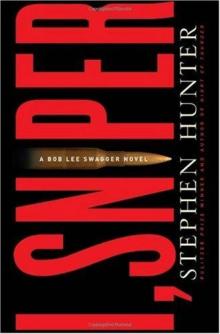 I, Sniper
I, Sniper Havana
Havana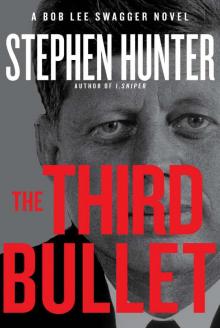 The Third Bullet
The Third Bullet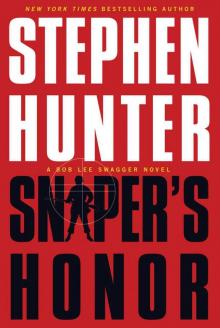 Sniper's Honor: A Bob Lee Swagger Novel
Sniper's Honor: A Bob Lee Swagger Novel Dirty White Boys
Dirty White Boys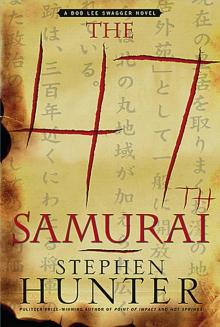 The 47th Samurai
The 47th Samurai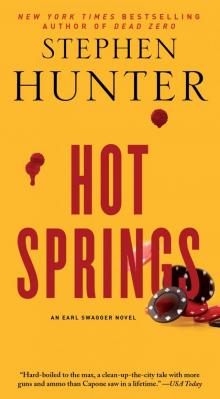 Hot Springs
Hot Springs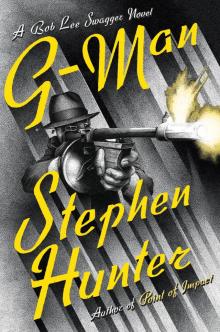 G-Man
G-Man Black Light
Black Light Time to Hunt
Time to Hunt The Day Before Midnight
The Day Before Midnight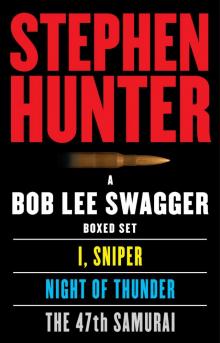 A Bob Lee Swagger Boxed Set
A Bob Lee Swagger Boxed Set The Master Sniper
The Master Sniper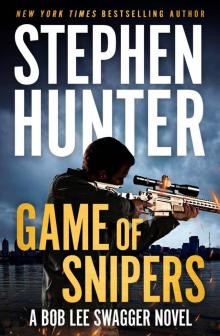 Game of Snipers
Game of Snipers Tapestry of Spies
Tapestry of Spies Citadel
Citadel The Second Saladin
The Second Saladin Stephen Longacre's Greatest Match
Stephen Longacre's Greatest Match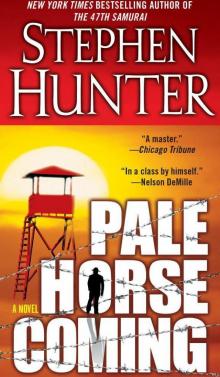 Pale Horse Coming
Pale Horse Coming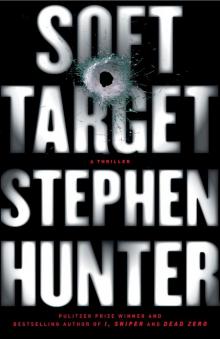 Soft Target
Soft Target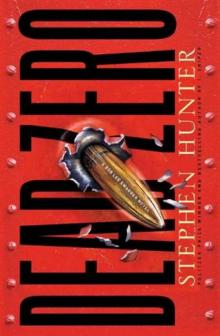 Dead Zero
Dead Zero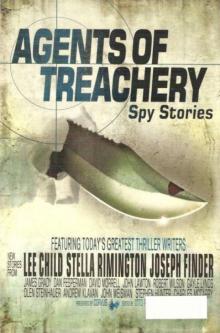 Casey at the Bat
Casey at the Bat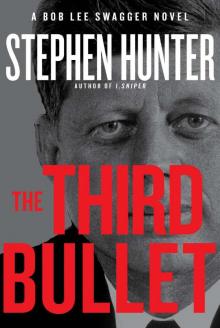 The Third Bullet bls-8
The Third Bullet bls-8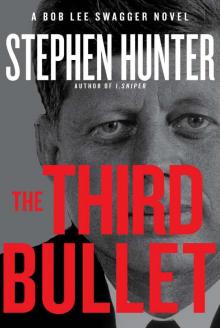 The Third Bullet: A Bob Lee Swagger Novel
The Third Bullet: A Bob Lee Swagger Novel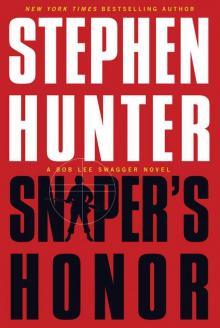 Sniper's Honor
Sniper's Honor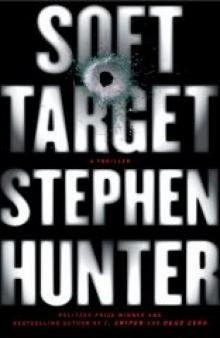 Soft target rc-1
Soft target rc-1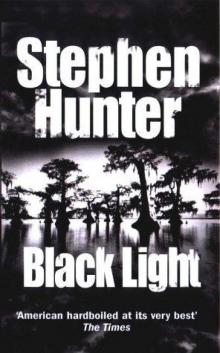 Black Light bls-2
Black Light bls-2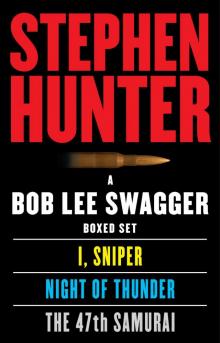 A Bob Lee Swagger eBook Boxed Set: I, Sniper, Night of Thunder, 47th Samurai
A Bob Lee Swagger eBook Boxed Set: I, Sniper, Night of Thunder, 47th Samurai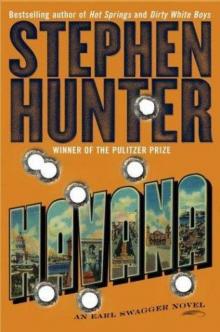 Havana es-3
Havana es-3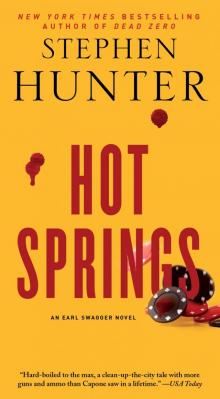 Hot Springs (Earl Swagger)
Hot Springs (Earl Swagger)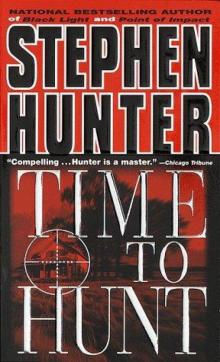 Time to Hunt bls-1
Time to Hunt bls-1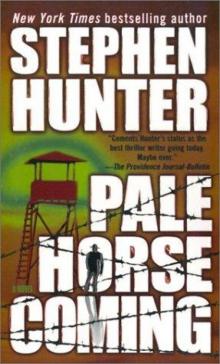 Pale Horse Coming es-2
Pale Horse Coming es-2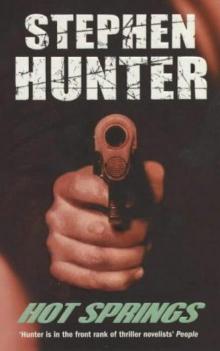 Hot Springs es-1
Hot Springs es-1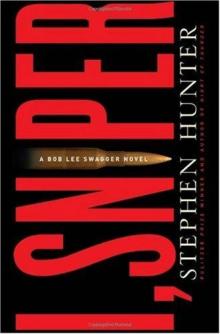 I, Sniper: A Bob Lee Swagger Novel
I, Sniper: A Bob Lee Swagger Novel